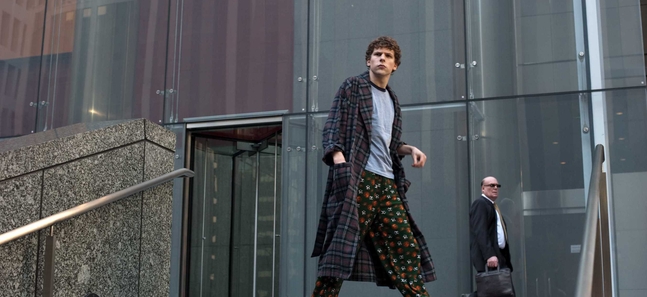The Social Network: David Fincher speaks
'Pay attention,' the director tells Time Out, 'or you're going to miss a lot'

Posted: Wed Jan 12 2011
David Fincher has hit on something with The Social Network – and he knows it. His scintillating, Harvard and California-set study of the genesis of Facebook plays like a dotcom version of The Great Gatsby, with runaway-train dialogue redolent of a ’40s screwball comedy. It’s a different film from that which we’ve come to expect from the man behind Fight Club, The Curious Case of Benjamin Button and Zodiac, though it still centres on a character – nebbish, super-rich Facebook co-founder Mark Zuckerberg (Jesse Eisenberg) – who, despite his best efforts, is unable to find happiness through human contact. Time Out met 48-year-old Fincher in Paris, where he was in a playful, outspoken mood while on a break from shooting the English-language version of The Girl with the Dragon Tattoo in Sweden.
So David, why make a film about Mark Zuckerberg?
He’s fascinating, he’s driven, he’s smart and he’s incredibly intolerant. Nobody came do me and said, 'Ya like Mark Zuckerberg?' They said, 'We have a really great script – would you like to read it?' But this is Zuckerberg as written by Aaron Sorkin because I must stress that I have not met him, I have just observed him from afar.
Do you identify with him?
I identify myself with almost every character in the movie. Yet as a director, I don’t feel you have to identify with your characters as a requirement to make a movie.
Do you think it matters that Zuckerberg is not an easy character to like?
Look, I’m not an obsequious studio development assistant: a lot of times, people like characters who need to be loved or liked. I like those characters. I like Jake LaMotta. I like Travis Bickle. I even like Rupert Pupkin. I like characters who don’t change, who don’t learn from their mistakes. Charles Foster Kane was a spoiled rotten eight year old with a sled and became a spoiled rotten 76 year old who may or may not have figured it all out in his last moments on earth. But he doesn’t change. If I’m trying to separate you from your wallet, I have to worry about whether you’re going to like what you see. But I’m not. I like people who think: Fuck it!
Did you try to make contact with Mark Zuckerberg?
By the time I got involved, the producer Scott Rudin had had the last official discussions with Facebook and they had parted ways. They had a list of a dozen 'requirements' for their participation, and the first two were: it can’t take place at Harvard and you can’t call it Facebook. So, Rudin, who’s not a dumb guy, just said that discussions didn’t need to go any further: we’re going to make a movie about the litigation, as the depositions are all part of the public record and we can glean from them the drama we need to make our film.
Were representatives of Facebook invited to see the finished film?
There was a contingent from Facebook Legal and Facebook Corporate Communications who saw the movie, but I don’t know the specifics of that as I wasn’t at the screening.
What did they think of it?
Again, I wasn’t there, but it was relayed to me by the person whose job it was to deliver the movie print to the screening room that they were… appropriately appalled.
The film has been launched on a very smart wave of marketing…
Yes, but my problem with the ad campaign is that you can’t just say, 'Punk, genius, billionaire', because it’s using that narcissistic MTV flash to get kids interested. I wanted to include 'Judas' or 'traitor,, because you’ve got to have a bad word in there. 'Punk, genius, billionaire' is basically a giant blowjob.
The dialogue at the beginning of the film moves extremely quickly.
The first scene in a movie should teach the audience how to watch it. I’ve got a contract for two hours and 19 minutes. I have final cut at two hours and 19 minutes. As long as I can make it in that time, I can do whatever the fuck I want. I held this 166-page script in my hand, I got the first nine pages, handed them to Aaron Sorkin, took a stopwatch out and said: 'Talk.' He did it – it was funny. And that’s going to pin people back, and you know what? It’s not going to start in black as was written. They’re going to start talking over the fucking Columbia Pictures logo! If I could’ve put the opening lines of dialogue over a trailer, I would’ve done that. It’s shut-the-fuck-up time: pay attention, or you’re going to miss a lot.
One thing you’ve said already about The Social Network is that you fear people might see it as slight.
It’s glib, for sure, but we’re talking about a lot of big notions. But yeah, when I saw the first cut of it, I thought it was a little slight. For me, it was an interesting bitter pill, and you needed so many spoonfuls of sugar to help you swallow it. But I didn’t want the sugar to get in the way of the sadness at the end of it. With Benjamin Button, the biggest concern was that it would be maudlin. I feel this is the right version of this movie. But I do like to worry. I was worried that Seven and Fight Club weren’t violent enough…
This is your most talky film. As a director known for your distinctive visual sense, did you have as much fun sculpting words and performances?
There are two things I’m responsible for. One is whether or not I’m presenting believable behaviour, which is totally subjective. The other thing is camera position: from where am I going to see this person? People think of directing as the Big Circus: yes, 90 per cent of directing is getting the money and getting the right equipment and the right people and departments to create the right feeling out of the right context. In film, we sculpt time, we sculpt behaviour and we sculpt light. Audiences only get to see what we show them at that moment, I control everything they hear and see. I’m hoping that these elements will translate into feeling. It was Louis B Mayer who said, 'The genius of the movie business is that the only thing the purchaser gets is a memory.' That’s what directing is.
Could you tell us something about your forthcoming take on Stieg Larsson's The Girl With the Dragon Tattoo'?
For the record, this is not a remake. Steven Zaillian wrote the screenplay, started from the book and has chosen some of the same scenes to dramatise. But no, it’s the book. I haven’t really developed my stock answers to questions about what the film going to be like, but hopefully a Chinatown-esque version tucked in there somewhere. I actually think there is a real efficiency to the Swedish movies that are more akin to Hollywood thrillers. I’m going to Sweden because I want to make a Swedish movie. That’s the production value here.
The Social Network opens in Japan on January 15
Now click here to read Time Out's review of The Social Network
Tweets
- About Us |
- Work for Time Out |
- Send us info |
- Advertising |
- Mobile edition |
- Terms & Conditions |
- Privacy policy |
- Contact Us
Copyright © 2014 Time Out Tokyo














Add your comment